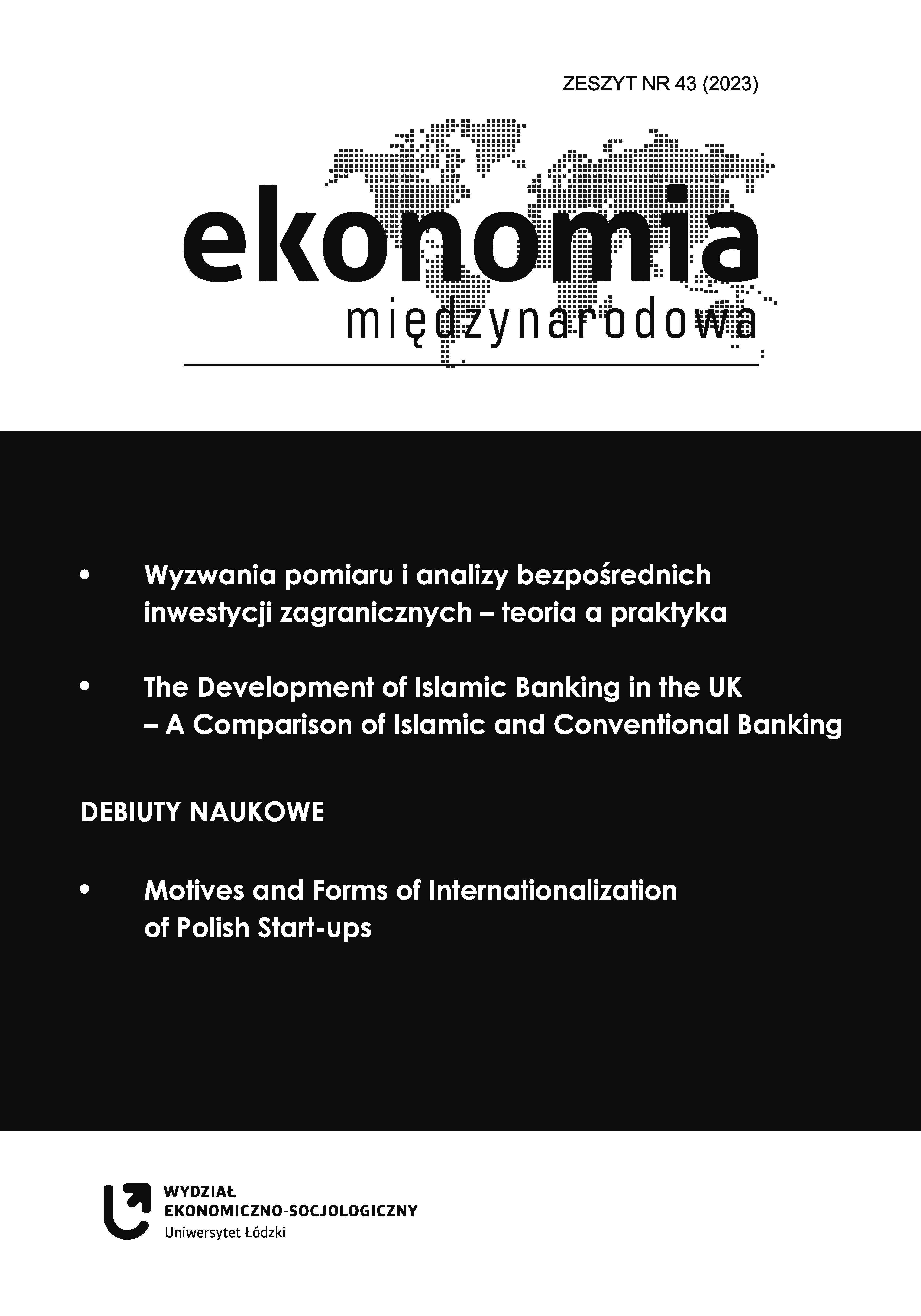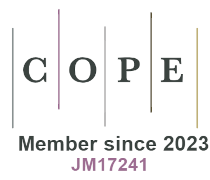Motives and Forms of Internationalization of Polish Start-ups
DOI:
https://doi.org/10.18778/2082-4440.43.03Keywords:
start-ups, internationalization, management, foreign in-vestment, small and medium-sized enterprisesAbstract
Research background: Due to the rapid development of technology, the possibilities of entering new markets are changing. This is evident in the ease with which new companies enter new markets. Tools enabling the rapid transfer of information have meant that the classical stages of internationalization are often overlooked. Classic models of internationalization are often criticized, but this does not mean that there are no new models of internationalization. Considering the importance of start-ups in the economy, it is worth examining how they behave on international markets.
Purpose of the article: The main goal of the paper is to answer the following research questions: What forms of foreign expansion do Polish start-ups choose? What methods and tools do Polish start-ups choose on their way to internationalization? What are the motives for the internationalization of Polish start-ups? What are the stages of internationalization of a Polish start-up company? The research hypothesis is as follows: the most common form of internationalization of Polish start-ups is export.
Methods: The paper uses the following methods: critical analysis of the literature, online, paper and phone questionnaire and in-depth CATI interview. The data used in the article was collected by the author. The survey was conducted on a sample of 174 respondents, and the interview on a sample of 23 respondents. The study was conducted in the period from January 10, 2021 to January 7, 2023.
Findings and value added: This paper is the first comprehensive study of Polish start-ups focusing on internationalization motives, tools, determinants and possible stages. The most common motives for the internationalization of Polish start-ups are reactive motives. Enterprises choose exports as a way to enter new markets. The main tools supporting internationalization are social media profiles run in a foreign language and a network of contacts composed of people from the entrepreneur’s environment. The research has shown that companies follow certain stages of internationalization.
References
Äijö, T., Kuivalainen, O., Saarenketo, S., Lindqvist, J., Hanninen, H. (2005). Internationalization handbook for the software business. Espoo: Centre of Expertise for Software Product Business.
Google Scholar
Czinkota, M., Ronkainen, I.A., Ortiz, M. (2004). The Export Marketing Imperative. Thomson.
Google Scholar
Dana, L.P., Hamilton, R.T., Wick, K. (2009). Deciding to export: An exploratory study of Singaporean entrepreneurs. "Journal of International Entrepreneurship", 7(2), 79–87.
Google Scholar
DOI: https://doi.org/10.1007/s10843-008-0032-8
Daszkiewicz, N. (2016). Determinanty tempa internacjonalizacji przedsiębiorstw ze szczególnym uwzględnieniem born globals. "Studia Ekonomiczne. Zeszyty Naukowe Uniwersytetu Ekonomicznego w Katowicach", 271, 7–16.
Google Scholar
European Startup Network (2023). Retrieved from https://europeanstartupnetwork.eu/vision/ (accessed: 1.09.2023).
Google Scholar
Ferguson, S., Henrekson, M., Johannesson, L. (2019). Getting the Facts Right on Born Globals. IFN Working Paper, 1210, 259–276.
Google Scholar
DOI: https://doi.org/10.1007/s11187-019-00216-y
Hinings, B., Gegenhuber, T., Greenwood, R. (2018). Digital innovation and transformation: An institutional perspective. "Information and Organization", 28(1), 52–61.
Google Scholar
DOI: https://doi.org/10.1016/j.infoandorg.2018.02.004
Jafari Sadeghi, V., Dutta, D.K., Ferraris, A., Del Giudice, M. (2020). Internationalisation business processes in an under-supported policy contexts: evidence from Italian SMEs. "Business Process Management Journal", 26(5).
Google Scholar
DOI: https://doi.org/10.1108/BPMJ-03-2019-0141
Jarosiński, M. (2013). Procesy i modele internacjonalizacji polskich przedsiębiorstw. Oficyna Wydawnicza Szkoły Głównej Handlowej, Warszawa.
Google Scholar
Johanson, J., Vahlne, J.E. (1977). The Internationalization Process of the Firm – A Model of Knowledge Development and Increasing Foreign Market Commitments. "Journal of International Business Studies", 8(1), 23–32.
Google Scholar
DOI: https://doi.org/10.1057/palgrave.jibs.8490676
Koch, M. (2017). Tech Start-up Internationalisation: Development of an internationalisation model for born global web-based tech start-ups from European start-up hubs.
Google Scholar
Lindsay, V., Rod, M., Ashill, N. (2017). Institutional and resource configurations associated with different SME foreign market entry modes. "Industrial Marketing Management", 66, 130–144.
Google Scholar
DOI: https://doi.org/10.1016/j.indmarman.2017.07.014
Maciejewski, M., Wach, K. (2019). International Startups from Poland: Born Global or Born Regional? "Journal of Management and Business Administration Central Europe", 27(1), 60–83.
Google Scholar
DOI: https://doi.org/10.7206/jmba.ce.2450-7814.247
Melén Hånell, S., Nordman, E.R., Tolstoy, D. (2019). Born Globals or Born Regionals? A Study of 32 Early Internationalizing SMEs. In International Business in a VUCA World: The Changing Role of States and Firms (Progress in International Business Research, 14), Emerald Publishing Limited, Bingley, 289–308.
Google Scholar
DOI: https://doi.org/10.1108/S1745-886220190000014016
Oviatt, B., McDougall, P. (2005). Defining International Entrepreneurship and Modeling the Speed of Internationalization. "Entrepreneurship Theory and Practice", 29(5), 537–554.
Google Scholar
DOI: https://doi.org/10.1111/j.1540-6520.2005.00097.x
Pawęta, E., Chung-Yu, C. (2015). Opportunities and threats analysis for european born global companies on the chinese market. "Krakowskie Studia Międzynarodowe", XII (3), 177–187.
Google Scholar
Przybylska, K. (2010). Born global – nowa generacja małych polskich przedsiębiorstw. "Gospodarka Narodowa", 7–8, 63–84.
Google Scholar
DOI: https://doi.org/10.33119/GN/101163
Rennie, M.W. (1993). Global Competitiveness: Born Global. "McKinsey Quarterly", 4, 45–52.
Google Scholar
Steinhäuser, V., Rocha, A. (2022). Institutional Theory and International Entrepreneurship: A Review. "Internext", 17(2), 264–283.
Google Scholar
DOI: https://doi.org/10.18568/internext.v17i2.684
Szarek, J., Piecuch, J. (2018). The importance of startups for construction of innovative economies. "International Entrepreneurship Review", 4(2), 69–78.
Google Scholar
DOI: https://doi.org/10.15678/PM.2018.0402.05
Wach, K. (2021). The evolution of the Uppsala model: Towards non-linearity of internationalization of firms. "International Entrepreneurship Review", 7(2), 7–19.
Google Scholar
DOI: https://doi.org/10.15678/IER.2021.0702.01
Published
Versions
- 2024-06-19 (2)
- 2023-09-30 (1)
How to Cite
Issue
Section
License

This work is licensed under a Creative Commons Attribution-NonCommercial-NoDerivatives 4.0 International License.









